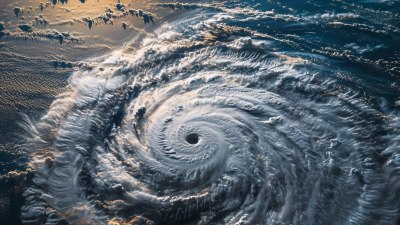Not Everyone Deserves to Be Your Umbrella in Emotional Weather
Explore why not everyone should shield you during emotional storms and learn to protect your well-being by choosing support wisely.

Life is an unpredictable journey filled with moments of joy, success, challenges, and heartache. Just like the weather, our emotional state fluctuates wildly, sometimes basked in sunshine and warmth, and other times drenched by relentless storms of sorrow, stress, or anxiety. When clouds gather overhead, and emotions pour down like rain, we often seek an umbrella—someone to shelter and support us through tough times. But not everyone deserves to be that umbrella.
The metaphor of an umbrella in emotional weather symbolizes those instead of standing in your way or adding to the storm, choose to protect, comfort, and shield you. A proper umbrella shields us from the rain but can also fail or even magnify discomfort if flawed. It is important to realize that not everyone who offers to shield us during our vulnerable moments has the capacity or intention to do so effectively or kindly.
Understanding why we should be selective about who we allow under our emotional umbrella is essential for maintaining mental and emotional well-being. Failed or misplaced trust can worsen an already difficult emotional storm. It can leave us feeling more exposed, hurt, or even betrayed. This article explores why not all relationships or individuals are suited for this protective role, how to identify the right emotional umbrellas, and the benefits of cultivating healthy emotional support systems in your life.
Emotional Weather: The Storms We Face
Emotional weather encompasses the spectrum of feelings and psychological states we encounter, such as sadness, anger, fear, disappointment, or confusion, often triggered by life events. These emotional storms can range from mild melancholy to severe anxiety or depressive episodes.
Storms occur due to loss, conflict, failure, or trauma, affecting our ability to function or simply our state of mind. During these moments, we naturally tend to seek intimacy and support from others to find relief and comfort. However, our choices in who we rely on can dramatically influence whether we feel safe or further endangered emotionally.
Why Not Everyone Makes a Good Emotional Umbrella
It's tempting to turn to anyone who shows concern or who appears willing to help during distress. Yet, several reasons exist why not everyone deserves this role as an emotional protector:
Lack of Empathy: Some people struggle to understand or relate to others’ feelings. Their inability to perceive or validate emotional pain can make their presence feel dismissive or cold.
Self-Interest or Manipulation: Unfortunately, some individuals might use another’s vulnerability to manipulate or control, preying on emotional weakness rather than offering genuine support.
Emotional Unavailability: Others may be overwhelmed by their own issues or simply unable to provide the emotional resources required to be supportive, leading to neglect or insensitivity.
Judgment and Criticism: Instead of offering safety, some react with criticism or judgment, heightening feelings of shame or inadequacy during already challenging times.
Inconsistency and Unreliability: An unstable or unpredictable presence can cause more anxiety rather than alleviate it, making emotional weather even more tumultuous.
Recognizing the Right Umbrella: Qualities to Seek
Choosing who deserves to protect you emotionally is a vital skill in fostering resilience and well-being. Look for: Empathy—The ability to genuinely understand and share your feelings, not just offer superficial platitudes.
Trustworthiness—Someone who respects your confidentiality and shows consistent, reliable behavior in supporting you.
Non-Judgmental Attitude—A person who listens with an open heart and mind, accepting your emotions without ridicule or blame.
Patience and Presence—Those willing to give you time and space, without rushing you to ‘fix’ feelings prematurely.
Positive Intentions—An underlying desire to see you heal and grow, rather than benefit at your expense.
Building a Network of Emotional Umbrellas
It’s rare to find a single individual who fulfills all these qualities perfectly. Emotional support often comes from a diverse network composed of friends, family members, therapists, mentors, or support groups.
This diversity ensures that when emotional rain falls, multiple umbrellas are available, each suited to different needs or contexts. For example, a close friend may provide daily encouragement, while a professional counselor offers tools for deeper healing.
Investing in these relationships means nurturing trust, openness, and mutual care over time, not just calling on someone only when emotional storms hit. Reciprocal emotional safety is a cornerstone here; support should be a two-way street that fosters strength rather than dependency or burden.
Setting Boundaries: Protecting Your Emotional Space
Recognizing who not to allow under your umbrella involves setting clear emotional boundaries. Boundaries help define where your emotional space begins and ends, protecting you from harm or overexposure.
Boundaries may include limiting contact with negative individuals, refusing to engage in harmful conversations, or politely declining unsolicited advice. Saying no to those who invalidate or belittle your feelings preserves your dignity and emotional health.
Healthy boundaries do not distance you from care but rather create a refuge where your feelings can be expressed safely and authentically.
Learning to Be Your Own Umbrella
While external support is invaluable, ultimately, emotional resilience comes from internal strength too. Developing self-compassion, mindfulness, and healthy coping skills empowers you to weather storms when external umbrellas are absent or inadequate.
Practices like journaling, meditation, exercise, or creative expression can provide solace and clarity. Sometimes, being your own umbrella means acknowledging your feelings without judgment and knowing you have the capacity to survive and grow despite emotional hardships.
This self-reliance complements relationships by reducing overdependence and fostering a balanced emotional ecosystem.
Understanding Temporary Umbrellas Versus Lifelong Protectors
Not all support must be permanent. Some people function as temporary umbrellas—offering shelter during a specific crisis but not destined for long-term involvement.
Recognizing this distinction prevents disappointment if a relationship fades or changes over time. Cherish those who help you in particular seasons of life without expecting every umbrella to endure forever. Focus on quality and intent rather than longevity.
When to Seek Help Beyond Your Umbrella Network
Certain emotional storms require professional intervention beyond friends or family support. If feelings become overwhelming, persistent, or accompanied by thoughts of self-harm, it is critical to reach out to trained mental health professionals.
Therapists and counselors offer specialized guidance, coping strategies, and unbiased perspectives crucial for healing complex or severe emotional difficulties.
Recognizing when your personal umbrellas are insufficient is an act of strength and responsibility toward your well-being.
Cultivating Gratitude for Genuine Support
Appreciating those who willingly become your umbrella fortifies your emotional connections. Expressing gratitude encourages deeper bonds and may reinforce their supportive role.
Small gestures like a sincere thank you, listening attentively in return, or showing kindness help sustain a nurturing relational atmosphere, ensuring that mutual feel protected from the emotional rain.
The Risks of Umbrella Envy and Overdependence
Comparing your emotional support to others’ networks can lead to feelings of inadequacy or envy. This ‘umbrella envy’ can distract from valuing what you do have and create unrealistic expectations.
Similarly, relying excessively on others creates emotional overdependence that burdens your umbrellas and stunts your personal growth. Striking a balance between seeking help and cultivating independence prevents these risks.
Conclusion: Navigating Emotional Weather with Discerning Trust
Not everyone deserves your trust and care when emotional storms hit. By recognizing who makes a genuine and respectful umbrella, setting clear emotional boundaries, and nurturing internal strength, you can create a healthier and more resilient support system.
This approach protects your well-being and cultivates relationships that honor and sustain your emotional needs during the inevitable rains of life.
Let your emotional umbrellas be chosen carefully, valued deeply, and complemented by your own self-care, so you flourish even in the stormiest weather.











